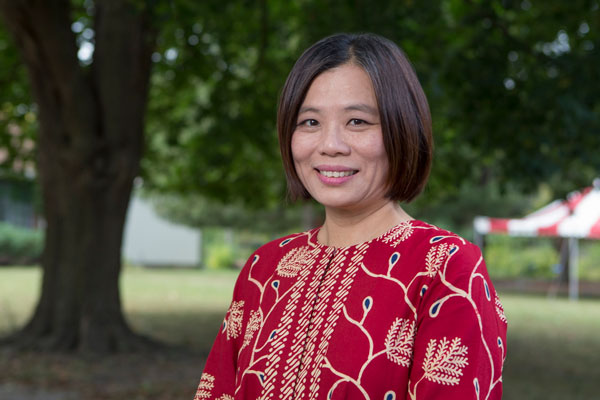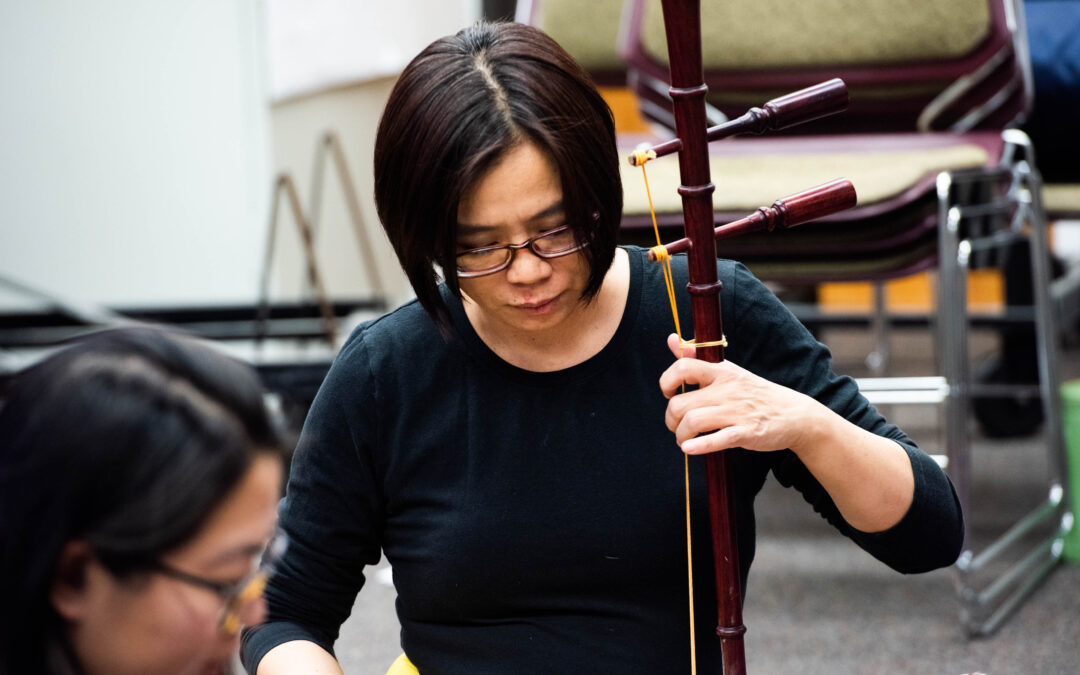Jui-Ching Wang
Associate Professor of World Music
 What year did you start working at NIU?
What year did you start working at NIU?
I started working at NIU in 2004 when I was still an ABD (all but dissertation).
Where is your hometown? Where do you live now?
I grew up in a small town nearby Hsinchu City in Taiwan. I live in DeKalb now.
Where did you attend college and what degree(s) have you earned?
I attended the music department at Soochow University in Taipei, where I received my BFA degree in music in 1993. I came to NIU as a graduate student in 1995 and earned two Master of Music degrees, one in Piano Performance (1997) and the other in Music Education (1998). I went on to pursue doctoral study in music education at Arizona State University, and I received my doctoral degree in 2007.
What do you like about working at NIU?
NIU has most of the resources I need to develop my career in higher education. The support I’ve received from professional staff, administrators, and my colleagues who I have worked with is beyond my expectation. I’ve also had many opportunities to work with serious learners, both graduate and undergraduate students, to help them develop their career, which is absolutely rewarding throughout my time here.
What advice would you give to students currently attending NIU?
Take advantage of what the faculty can offer. Challenge the faculty in a positive way! For me, teaching is learning, and I am all about embracing challenges from my students because I believe that each of my students is unique, and it will keep me motivated and wanting to learn more from each of them.
Tell us about a research or engaged learning project you have led.
I am interested in children’s singing games and am intrigued by how effectively children learn from each other in play. I have conducted several research projects, including one sponsored by the Fullbright Foundation in 2016-17, to study Javanese children’s singing games in various historical contexts. Specifically, I look into the sociocultural functions these singing games play in child development in Indonesia. I plan to expand this project to study singing games of various Asian cultures, such as Japan, Korea, Taiwan, Thailand, and Vietnam.
What do you hope students take away from your class?
What I want for my students to take away from my class is a learning habit that allows and motivates them to learn anywhere and anytime. What I teach content-wise in the classroom setting is limited, so I am always hopeful that my students will learn beyond the course materials and will transcend their learning to a higher level where they would become their own teacher to improve themselves day after day even after they are done with school.
What is your favorite campus event?
I enjoy most attending School of Music concerts. Sometimes I go watch football or basketball games. I would also attend cultural events, such as Southeast Asian Cultural Night.
What is your favorite memory of NIU?
Going to football games with my students. Seeing many of my students play in the Huskie Marching Band always excites me! Hosting many concerts and world music festivals in the School of Music is always a fond memory as well!
Who has influenced your professional path?
Dr. Kuo-Huang Han, my predecessor, was always there when I needed his guidance in getting myself ready to teach at NIU when I first started here in 2004.
What did you want to be when you were growing up? Are you currently doing it? If not, what changed your path?
I was hoping that I would become a diplomat because when I was younger, I always dreamed about traveling around the world as a grown-up, and I really enjoy learning different cultures somewhere out there. Although I did not pursue this “dream job,” I have managed my study and my career so that I can constantly learn something new about world cultures and can travel as much as I could as an academic. Being able to promote cultural understanding through music, which is a big part of my job, makes me feel that I am somewhat a cultural ambassador as well.
Are you a member of or hold a position within a professional organization? If so, what organization? What is the purpose of that organization and how does being part of this organization benefit you in your role at NIU?
I am a member of several important professional organizations in ethnomusicology and music education, such as the Society for Ethnomusicology (SEM), International Council for Traditional Music (ICTM), International Society for Music Education (ISME), and National Association for Music Education (NAfME). The primary purpose of these organizations is to network with other academics like me and to improve myself to be up to date in teaching and scholarship.
In addition to being a member, I currently serve on the Editorial Board for ISME’s International Journal of Music Education, and am on the Advisory Board for NAfME’s Music Educators Journal. I review approximately six to eight manuscripts annually for them. Through this process, I make myself familiar with current research and practical trends in music education not only in the U.S. but also the world.
I think being part of the organizations and holding a position within them helps me to demonstrate to our students that learning and teaching are a life-long process and that there are always people out there that you can benefit from if you are willing to learn.
What do you do to relax or recharge?
I travel a lot during breaks, and sometimes I would align the trip with professional engagements. Being able to visit different places and people always gives me “fresh air” that is so enjoyable! And I go to the movies often to indulge myself at a space and time that would take me out of my work routine. A two-hour treat to allow my imagination to go wild is an effective way to recharge.
Jui-Ching Wang is an associate professor in the School of Music, College of Visual and Performing Arts.
To see more Huskie Spotlights, visit the NIU Website.

